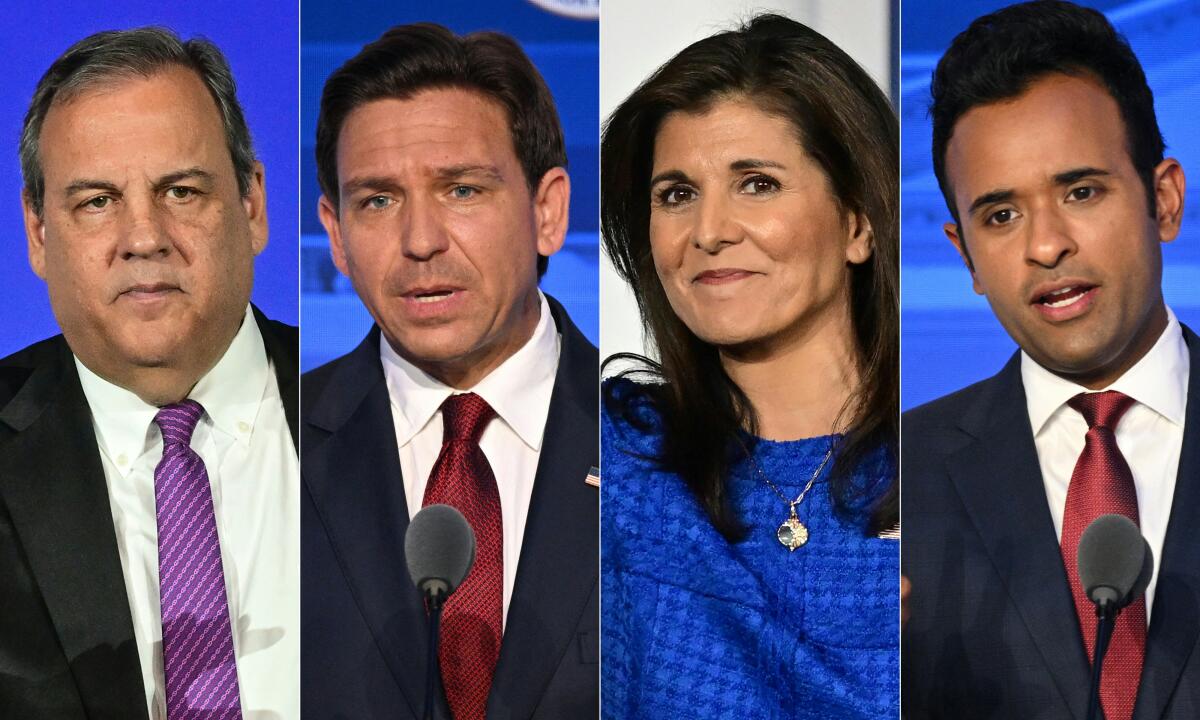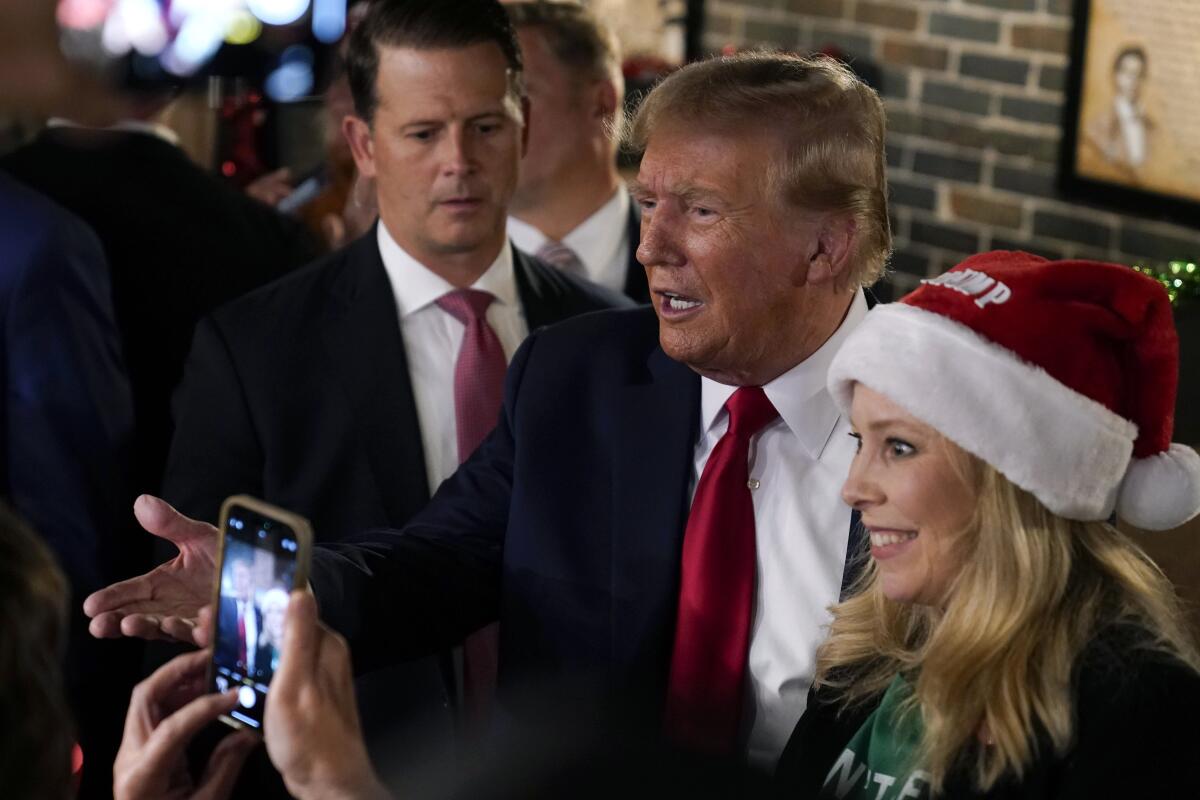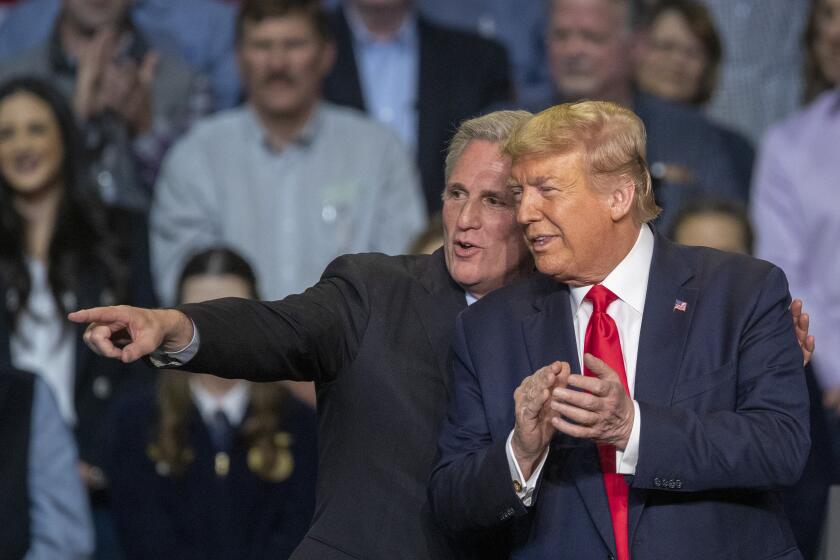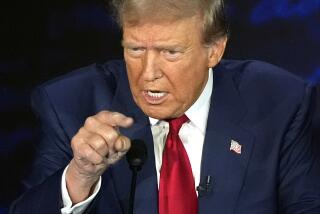Four takeaways from Wednesday night’s GOP presidential debate

- Share via
Four of the Republicans trying to beat former President Trump for the GOP nomination clashed at a fiery debate in Tuscaloosa, Ala., on Wednesday night — one of the last major opportunities to change the dynamic in the 2024 primary.
“It is make-or-break time for the candidates on this stage right now,” said Elizabeth Vargas, a news anchor for NewsNation, the fledgling network that hosted the debate.
Although the weeks before the Iowa caucuses, the first presidential nominating contest in the nation, are usually among the most exciting and frenzied periods of any presidential campaign, the 2024 GOP race appears suspended in amber.
Trump’s lead over his Republican rivals in polls has only grown over the course of the party’s debates — all of which he has skipped. And the time for his foes to knock him off his perch is shrinking fast.
Here are some top takeaways from the face-off in the heart of Dixie.
Trump’s bet is paying off
The former president has not set foot on a debate stage this year. The decision to let his rivals bicker while he campaigns seems to be paying off.
Trump remains the prohibitive favorite to be the 2024 nominee. And although this year’s GOP debates have prompted fluctuations among the field of candidates, polling shows that he has either increased or roughly maintained his lead over his Republican rivals in national and early-state polling after each televised encounter.

Nationally, his 41-point lead over his closest rival during the August debate in Milwaukee grew to 43.1 points by the time of the Simi Valley face-off in September and to 44.1 points at the time of the Miami face-off in November, according to an analysis of polls by Real Clear Politics. Shortly before tonight’s gathering in Tuscaloosa, Trump was leading his closest Republican opponent by 48.1 points.
The former president’s leads in Iowa and New Hampshire — the states that hold the first two GOP nominating contests in the nation in January — are weaker than in national polls, according to Real Clear Politics’ averages. However, Trump still consistently swamps his rivals in polls of the two states.
Trump typically holds public appearances at the same time as the Republican debates to try to siphon attention away from his competitors. But he took a different course tonight, headlining a closed-door fundraiser in Hallandale Beach, Fla., according to the Associated Press.
The previous night, he spoke with Fox News host Sean Hannity at an event in Davenport, Iowa, where supporters screamed, “I love you, Trump!” and “We need you back!”
“We have crowds that are incredible in Iowa. We’re here last week. We had overflow crowds,” the former president told about 900 supporters, as he crowed about his lead in the polls in the state, whose Jan. 15 caucuses will be the first GOP nominating contest in the nation.
“Other candidates have seven people standing on a farm and they’re talking,” he said. “It’s a very nice thing to watch, especially for me. I enjoy watching that.”
During the appearance, Hannity asked Trump whether he would ever abuse his power to seek retribution against others. Trump declined to rule that out if he is elected president again.
The return of Megyn Kelly
Kelly, a lawyer and controversial veteran political reporter who hosts SiriusXM’s “The Megyn Kelly Show,” was one the three women who moderated the NewsNation debate.
She was one of Fox News’ most popular hosts until she lost the support of some conservatives over her 2015 GOP presidential debate grilling of Trump about misogynistic comments he has made.

The then-candidate appeared to pin Kelly’s demeanor to her menstrual cycle.
“You could see there was blood coming out of her eyes,” Trump said on CNN. “Blood coming out of her wherever.”
Trump later said that he was referring to Kelly’s nose when he said “her wherever,” a clarification that didn’t sit well at the time with people who were appalled by his statement. But the remark, like many Trump made during the 2016 campaign, ultimately didn’t stop him from winning the GOP nomination and eventually the White House.
Kelly left Fox in 2017, and briefly worked for NBC before joining Sirius. The Republican National Committee selected her to co-moderate Wednesday’s debate.
Kelly’s performance during the debate reminded viewers why she was admired as a skilled interviewer. As she described purported weaknesses of Trump and President Biden, she directly questioned the candidates about their electability — or lack thereof.
Noting that Florida Gov. Ron DeSantis was viewed as the most formidable challenger to Trump when he entered the race, but his campaign now appeared to be sputtering, Kelly asked, “Is it fair to say, as Sen. Tim Scott did when he dropped out, that voters are telling you not no, but not now?”
And she highlighted former New Jersey Gov. Chris Christie’s support for Trump in the 2016 and 2020 presidential contests, and then his decision to run in this election as the truth-teller willing to make the case against Trump’s fitness for office.
“You can say that you got into this race just to stop President Trump,” she said before comparing Trump’s strong approval ratings among Republican voters with Christie’s tepid support. “Respectfully, governor, you have not stopped Mr. Trump. And voters may wonder how you could possibly become the nominee of a party that does not appear to like you very much.”
The field shrinks
Tonight’s debate featured four candidates: DeSantis, former United Nations Ambassador and South Carolina Gov. Nikki Haley, Christie and millennial entrepreneur Vivek Ramaswamy.
The participating candidates can be divided into three camps:
- DeSantis and Haley, who are locked in an MMA-style ring match to come in second place in early-state contests and consolidate support of the anti-Trump wing of the Republican Party.
- Christie, who relishes his role castigating Trump but remains mired in the single digits in polling outside New Hampshire. Even in the “Live Free or Die” state, Christie’s best showing was 14% in a survey last month.
- Ramaswamy, who appears to be this cycle’s Republican version of 2020 Democrat presidential hopeful Andrew Yang — a charismatic, nontraditional candidate who excites young people but is unlikely to draw significant support from the voters who actually turn out in caucuses and primaries. He is angrier than Yang and effusive in his support for Trump.
From the very first minutes of the debate, Haley was the target of wave after wave of attacks from DeSantis and Ramaswamy.
“I love all the attention, fellas,” Haley said with equal doses of Southern charm and vitriol. “Thank you for that.”
DeSantis attacked Haley for her policies on LGBTQ+ rights, her ties to China and her support from Wall Street donors. She responded that he was a liar and a hypocrite, and that he was jealous that donors who once supported him now back her.
Ramaswamy insulted her intelligence, saying his 3-year-old son could show her Israel on a map, called her a fascist and the puppet of corporate donors — frequently drawing boos from the audience as well as sharp denunciation from Christie, who called Ramaswamy an “obnoxious blowhard.”
Asked if she would like to respond, Haley said, “No. Vivek’s not worth my time to respond to him.”
Ramaswamy later told Christie, who has struggled with his weight, that he should “do everybody a favor, just walk yourself off that stage, enjoy a nice meal and get the hell out of this race.”
Parts of the debate focused on the front-runner who wasn’t there.
Trump “started off his campaign by saying, ‘I am your retribution.’ Eight years ago, he said, ‘I am your voice,’” Christie said. “This is an angry, bitter man who now wants to be back as president because he wants to exact retribution on anyone who has disagreed with him.”
Christie criticized his rivals on the stage, who said in a prior debate that they would support Trump if he won the nomination even if he was convicted of felonies. In March, Trump is scheduled to go on trial on federal charges that he illegally sought to overturn the results of the 2020 election, which is among the four indictments he faces in Washington, New York, Florida and Georgia.
“His conduct is unacceptable,” Christie added, prompting boos from the audience. “He’s unfit.... He doesn’t care for the American people. It’s Donald Trump first.”
DeSantis refused to answer whether he thought Trump was fit for office, but raised his age as well as his record in the White House.
“He is showing Father Time is undefeated. The idea that we’re going to put someone up there that’s almost 80 and there’s going to be no effects from that, we all know that that’s not true,” he said.
Why Alabama?
Debates typically take place in states that can play a significant role in the nominating contest or the general election, which led to some confusion when the University of Alabama was named as the host of tonight’s clash.
The first GOP debate this year took place in Wisconsin, a purple state that is among the most critical to winning the White House next year and will host next summer’s Republican National Convention.
The next one unfolded at the Ronald Reagan Presidential Library in Simi Valley — hallowed ground for Republicans that’s located in California, a Super Tuesday state that awards the most GOP delegates of any state in the nation. Despite its sapphire-blue tilt, the state has a deep trove of wealthy conservative donors.
In the race for the Republican presidential nomination, California is an afterthought for most. But the state is critical to Trump’s effort to return to the White House.
The last face-off took place in Florida, a onetime battleground state that has usually favored Republicans in presidential elections since 1952 and is home to two of the top competitors for the GOP nomination. It’s also home to a hub of Latino voters, among whom Republicans hope to expand their support nationwide.
On the surface, Alabama appears to be an anomaly. It is overwhelmingly red. It voted for Southerner Jimmy Carter in 1976, but otherwise hasn’t sided with a Democratic nominee since 1956. The state has fewer than one-third of the GOP nominating delegates California does, and certainly far fewer deep-pocketed donors.
But Alabama’s transformation into one of the nation’s most Republican states is emblematic of the South’s political evolution as well as the forces shaping the modern GOP.
Democratic Gov. George Wallace’s opposition to racial integration of the state’s universities and schools in the 1960s made him a symbol of white, conservative opposition to Black civil rights. Support for Wallace served as a steppingstone for many white voters to move toward the Republican Party, breaking their historic allegiance to the Democrats as GOP candidates began embracing the “Southern strategy” of seizing upon racial grievances to appeal to white voters in the region while the Democratic Party became more unified in support of racial equality.
That shift, cemented in the presidential campaigns of Richard Nixon and Ronald Reagan, set the pattern for politics in the South over the last half-century, in which Southern conservatives have become a dominant force in the GOP. Despite Trump’s campaigns being born in a New York City skyscraper, he reflects the politics seen below the Mason-Dixon Line.
More to Read
Get the L.A. Times Politics newsletter
Deeply reported insights into legislation, politics and policy from Sacramento, Washington and beyond. In your inbox twice per week.
You may occasionally receive promotional content from the Los Angeles Times.











